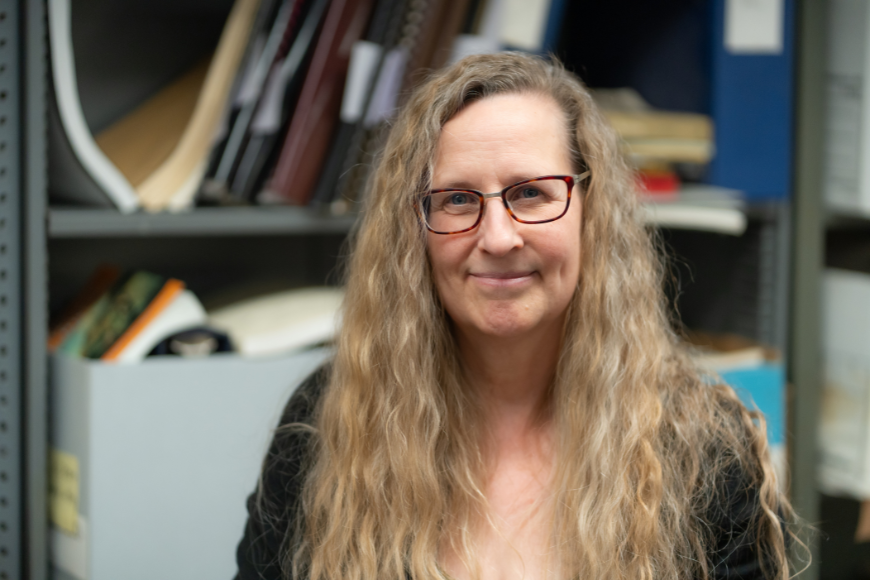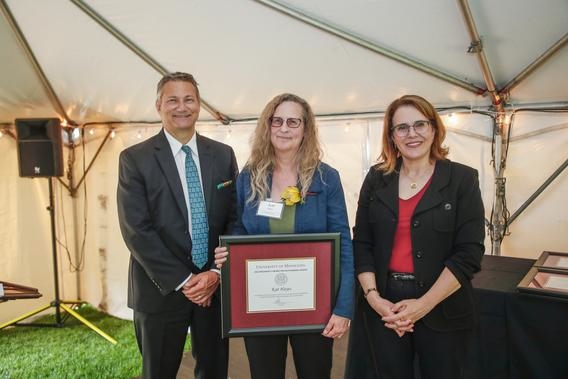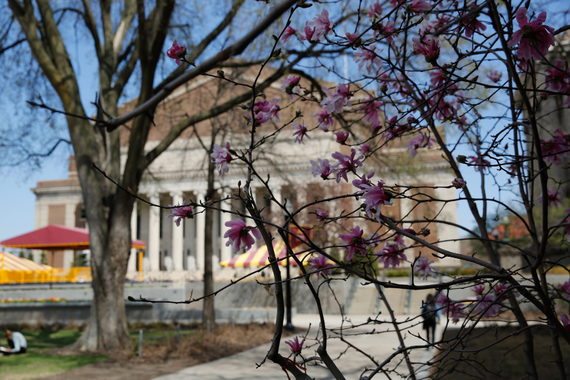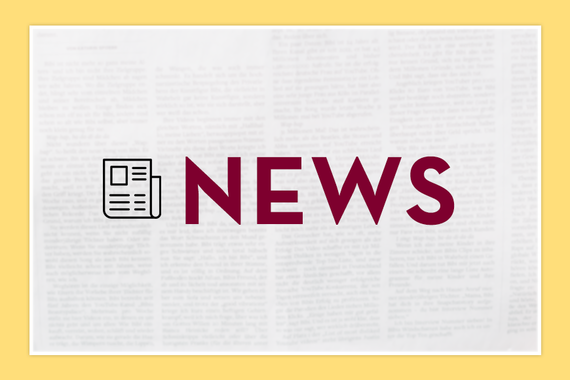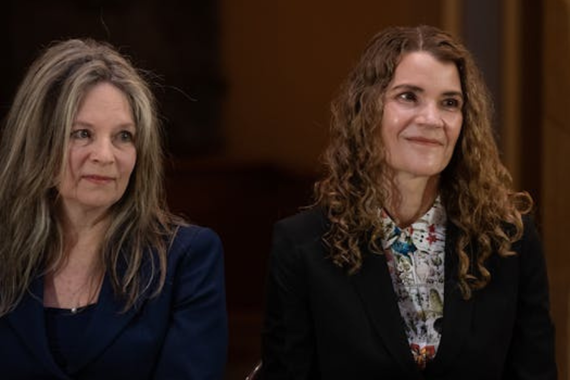The Intersection of Discovery and Discrepancy
You might call Associate Professor Kat Hayes a reluctant archaeologist.
“As an undergraduate studying anthropology, my end game was never archaeology,” she shares. “Instead, I was interested in that moment when you understand that certain characteristics about your identity aren’t a given, things like gender roles or ethnicity.”
How did these identities form and become the norm, Hayes wondered, and how do those complicated histories inform the present?
Eventually, these questions would inform her own cross-country journey into the field. Hayes earned her MA in Historical Archaeology from the University of Massachusetts Boston and her PhD in Anthropology from the University of California, Berkeley before arriving at the University of Minnesota.
Today, the 2024 Dean’s Medalist honoree seeks to challenge many of the inherently destructive practices of archaeology while centering representation and inclusion; contributions that have made an enduring impact on CLA, the University, and broader Minnesota communities.
Discovery and discrepancy
As a historical archaeologist, Hayes’ work exists at the intersection of discovery and discrepancy. She recalls a powerful revelation during her dissertation—the New York plantation site where she was conducting her research had used enslaved African laborers and Native Americans in its operation.
“My initial response was, ‘wow this is amazing, we never see this kind of thing happening, it’s a historical anomaly!’ But the more I got into it, the more I realized it wasn’t an anomaly at all, it’s much more common than we realized. It’s just that the way these histories are written later on, it had seemed improbable.”
Ultimately, the materials of the past can be used to craft a story, but sometimes that story is skewed. And until recently, Hayes explains, those stories focused on the “collection of stuff,” not the potential harm to the people whose heritage and history were being excavated.
This has resulted in an intentional shift in archaeology, one that includes thoughtful representation and an upholding of repatriation laws. “Many of my colleagues share this sentiment: if I were to start a project today, I wouldn’t start by sticking a shovel in the ground, I’d start by figuring out who has a stake. Whose history is this? Who really needs to have a voice? And is this something that could be potentially harmful if we pursue it?”
Whose voices are being buried?
Hayes hopes her recent research at the historic site of Fort Snelling at Bdote in Minnesota will reveal untold stories and inspire people to think about archaeology in a different way. A Carceral Landscape? reinterprets the place and material culture, while exposing some of the more uncomfortable histories of the Fort.
The project is a collaboration with the Minnesota Historical Society, combining the relics of the past—historic maps and photographs, archaeological remains, oral histories, and archived documents—with extended reality technology to develop digital interpretations of Fort Snelling at Bdote over the course of 200+ years.
“Archaeologists were very selective in the materials they used during initial interpretations at Fort Snelling,” Hayes explains. “They put aside a bunch of artifacts because they were only interested in certain portions of the materials. ‘These are not the stories we want to tell.’ But it’s important to look at the other material and consider whose voices are being buried.”
HistoryXR
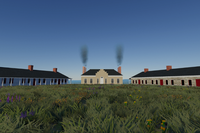
Hayes' project HistoryXR, shorthand for extended reality, hosts digital public history projects at various stages that are produced in collaboration with the Minnesota Historical Society and various community organizations.
One component of the project is Virtual MISLS, a tour of the Military Intelligence Service Language School during WWII. Formerly incarcerated Japanese Americans had been brought to Fort Snelling to learn the Japanese language and aid in the war effort. Hayes worked with members of the Twin Cities Japanese American Citizens League to build a 3D model of one of these language classroom buildings, and within it, a virtual museum to address this overlooked history.
“The models are meant to engage and draw people in, and once they’re drawn in, to be able to tell some of the stories in the ways that communities would like them to be told.”
These communities represent the heart of Hayes’ work. She is especially inspired by the Indigenous phrase, ‘nothing about us without us,’ an expression she hopes other practitioners strive to uphold, as well.
“We need to spend more time making sure that everybody is heard, and we need to slow it down. If you didn’t consult with everybody, there’s no way to put it back. Even with repatriation, you can return all of the materials but you can never make it right.”
Jumping borders and building programs
The 2024 Dean’s Medalist also embraces the titles ‘border jumper’ and ‘program builder.’ Hayes joined CLA’s anthropology department in 2008, but was welcomed as an affiliate faculty member in American Indian Studies a few years later and served as their department chair from 2015 to 2018.
Around the same time, she was also beginning conversations with Associate Professor Greg Donofrio (School of Architecture) and Professor Kevin Murphy (history) to discuss who was doing heritage studies and public history work. The trio suspected that this work was happening across the University and wondered how to align these interdisciplinary efforts.
“We ended up gravitating towards what it would look like if we created a graduate program that brought these various perspectives together in partnership with the Minnesota Historical Society,” Hayes describes. “We didn’t know if it was possible to create an interdisciplinary program, so we asked a lot of dumb questions to administrators and they mostly said, ‘I don’t know! Let’s try it!’”
They did.
And in 2017, the Master of Heritage Studies and Public History (HSPH) graduate degree was launched. The program is the only one of its kind in the world, combining archival research, archaeology, material culture studies, architecture, preservation and digital humanities, while also seeking to address the critical need for diversity and inclusion in the heritage fields.
"The planning required to launch this unique and complex program was formidable,” shares Murphy. “Dr. Hayes played the leading role in formulating the strategy and shepherding it through the approval processes. Due in no small part to her efforts, HSPH has flourished; it boasts an impressive placement record, draws a strong international pool of applicants, and recruits an exceptionally diverse student body.”
Support for the next generation of practitioners
While her roles and responsibilities have evolved—Hayes also served as director of the Center for Race, Indigeneity, Disability, Gender & Sexuality Studies between 2019-2021—her holistic student-centered approach has remained steadfast. What are students experiencing, she has often reflected, and how can she advocate for what they might need.
“With all of these program developments, I feel like I’m guided by putting students’ needs front and center,” she shares. “We need to trust students to tell us what they need and act on it, rather than simply telling them what they need. They’re the ones who are going to get out there and change the world; we need to support them first.”
Professor Hayes' favorite classes
I love this class! We collaborate with University archivists to bring students into the archive. If you’re going to do archival research, you have to understand how that archive was created. This means understanding issues of access, who gets to donate, how those materials are treated.
We think about the really bad history between American archaeologists and Native communities, and reflect on how we can do better now. What do we do differently?
Why Anthropology?
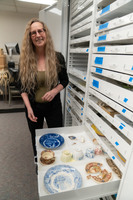
“It’s an extraordinarily capacious discipline, a place to situate yourself with respect to certain methods, reach out into literature of all kinds of different disciplines, and draw on everything in order to make sense of the world. We seek to understand human social life and history; when isn’t that applicable!?”
Support CLA Scholars
Faculty members like Associate Professor Kat Hayes are at the heart of CLA’s thriving academic community. Your gifts to support faculty will help strengthen relationships with community partners, advance measurable experimentation, and test new ideas.
